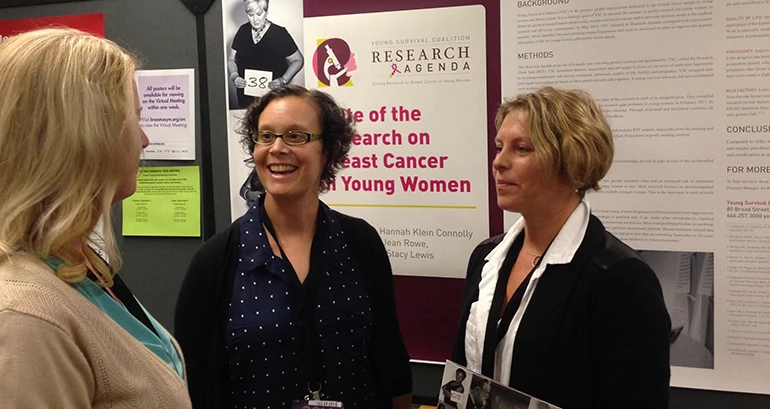Research Advocacy

Medical research is essential in the fight against breast cancer. But, it’s advocacy that empowers us to focus research to address the specific needs of young women affected by breast cancer.
Become a Research Advocate
You can play an important role in cancer research by becoming an educated consumer advocate.
Survivors have been instrumental in shaping research studies by helping researchers prioritize which questions to focus on to further improve the standard of care and quality of life issues most important to them. Educated activists review proposals and question researchers on whether the study will have meaningful impact or lead to a significant improvement in outcomes for many patients. It is up to you to make sure researchers are thinking about how their work helps all young survivors.
Educate Yourself
Understanding the science of breast cancer is important to be an effective and impactful advocate.
- Enroll in Project LEAD, The National Breast Cancer Coalition’s (NBCC) premier free science training course for activists. NBCC's site contains information about breast cancer advocacy, NBCC’s legislative priorities and training opportunities to become a stronger advocate.
- Explore the lectures and self-learning activities at Research Advocacy Network’s Advocate Institute.
- Check out the American Association for Cancer Research (AACR) Survivor Scientist Program, and attend scientific conferences like the American Society of Clinical Oncology’s Annual Meeting or the San Antonio Breast Cancer Symposium. Conference scholarships may be available to qualified advocate applicants. Prior training such as Project LEAD may be required.
- Check out YSC's RISE: Respected Influencers through Science and Education - which includes in-depth training and a year of service to help expand Breast Cancer Awareness.
After educating yourself, you can earn a place as a powerful advocate — a member of the team that prioritizes research, decides which research gets funded and clinical trial design.
Add Your Voice to the Research Process
You can make a difference by reviewing and helping to decide which studies receive funding by serving on peer review boards for research programs.
Find and apply for grant review programs at:
- Department of Defense Breast Cancer Research Program
- California Breast Cancer Research Program,
- Susan G. Komen's "Advocates in Science" program
- Patient-Centered Outcomes Research Institute
Together, we can help focus researchers on efforts to end breast cancer and improve the lives of all young women affected by breast cancer. If you'd like a letter of recommendation to serve in one of these programs, please email Director of Community Advocacy & Partnerships. If you’re applying to review grants for DOD or CABRCP, we require Project LEAD training or similar experience.
Our Research Agenda
Between 2012 and 2013, we revisited our Research Agenda through a Research Think Tank (RTT), which brought advocates, researchers and physicians together to determine the most pressing research questions in need of answers to improve the quality and length of life for young women affected by breast cancer. Thanks to the RTT, our Research Agenda offers guidance to helping solve many unknown questions about breast cancer in young women and lists our top research priorities. We strongly believe that researchers should focus on these questions to improve the lives and effective care for young women affected by breast cancer.
